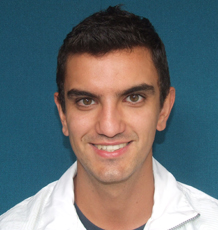by Alan McCall
Welcome back to the 3rd BJSM PhD Academy Awards for 2018-19. Voting is now closed and the People and the BJSM Editors have chosen their winners! Congratulations goes to Dimitris Vlachopoulos, our People’s Choice Award winner and Sheree Bekker for the Editors’ Pick Award!
We would like to thank all of the nominees for submitting their PhD summaries and videos for the Academy Awards, the quality of both have been outstanding! Your innovative findings are integral to moving our field forward. We are looking forward to the new class of 2019/20.
Here is our interview with Dimitris Vlachopoulos our People’s Choice winner. On Thursday, you’ll hear from Sheree Bekker.
Congratulations Dimitris! How does it feel to be chosen as the Peoples’ Choice?
I’m honoured to see my work recognised and supported by so many people, especially considering the strength of all the nominees’ projects. This great initiative by BJSM provides the opportunity to many brilliant researchers in the field to promote the hard work they have done as part of their PhDs.
What’s the elevator pitch summary of your thesis?
Adolescence is a crucial period for bone development and exercise can enhance bone acquisition. Sports can be considered as osteogenic, such as football, and as non-osteogenic, such as swimming and cycling. Despite football, swimming and cycling being among the most popular sports globally, there was lack of evidence comparing the effect of these sports on bone development and how it can be improved.
What was your most noteworthy finding?
The most noteworthy finding was that football participation results in better bone status at baseline and development after one year than swimmers and cyclists. There were no significant differences in bone development between non-osteogenic sports groups and controls and lean mass was the strongest determinant of the bone outcomes investigated.
Finally, one of the most important finings was that a jumping intervention programme can counteract the lack of osteogenic stimulus in adolescent athletes involved in non-osteogenic sports, such as swimming and cycling, and therefore can be included in the training programme to improve bone health during adolescence.
What was your most significant personal and/or professional lesson?
I developed my research skills over the years: I conducted (and published) cross-sectional, longitudinal and randomised controlled trial studies. This was really hard work. I developed so much respect for academics and researchers in the paediatric exercise medicine field and am now inspired to continue my career as an academic.
Where are you working now?
Currently, I’m assisting larger studies in different countries, which include other sports to compare bone health and development. Furthermore, I’m working with large longitudinal studies aiming to investigate the combined effects of exercise and diet for a health bone development during growth.
What’s next for you? How can research progress further?
I now am a Lecturer at the Sport and Health Sciences department in Exeter. I plan to extend my work to clinical populations and include more outcomes in my research projects. Research can progress further by implementing a holistic overview of the topics with the aim to provide useful evidence and practical recommendations to clinicians, sports professionals, academics and the public.
Any special thank-yous/shout outs?
I would like to acknowledge the supervisory team for their significant contribution to all parts of the present PhD and for their continuous support and guidance throughout the years: Dr Luis Gracia-Marco (PI), Dr Alan R Barker and Professor Craig A Williams. Also, I would like to thank all the participants, parents and sport coaches and schools who participated in the PRO-BONE study and the researchers of the Children’s Health and Exercise Research Centre who helped with the data collection over the years of my PhD. Finally, special thanks to BJSM for this initiative and for drawing attention to the contribution PhD students make to the sport and exercise medicine field worldwide.

